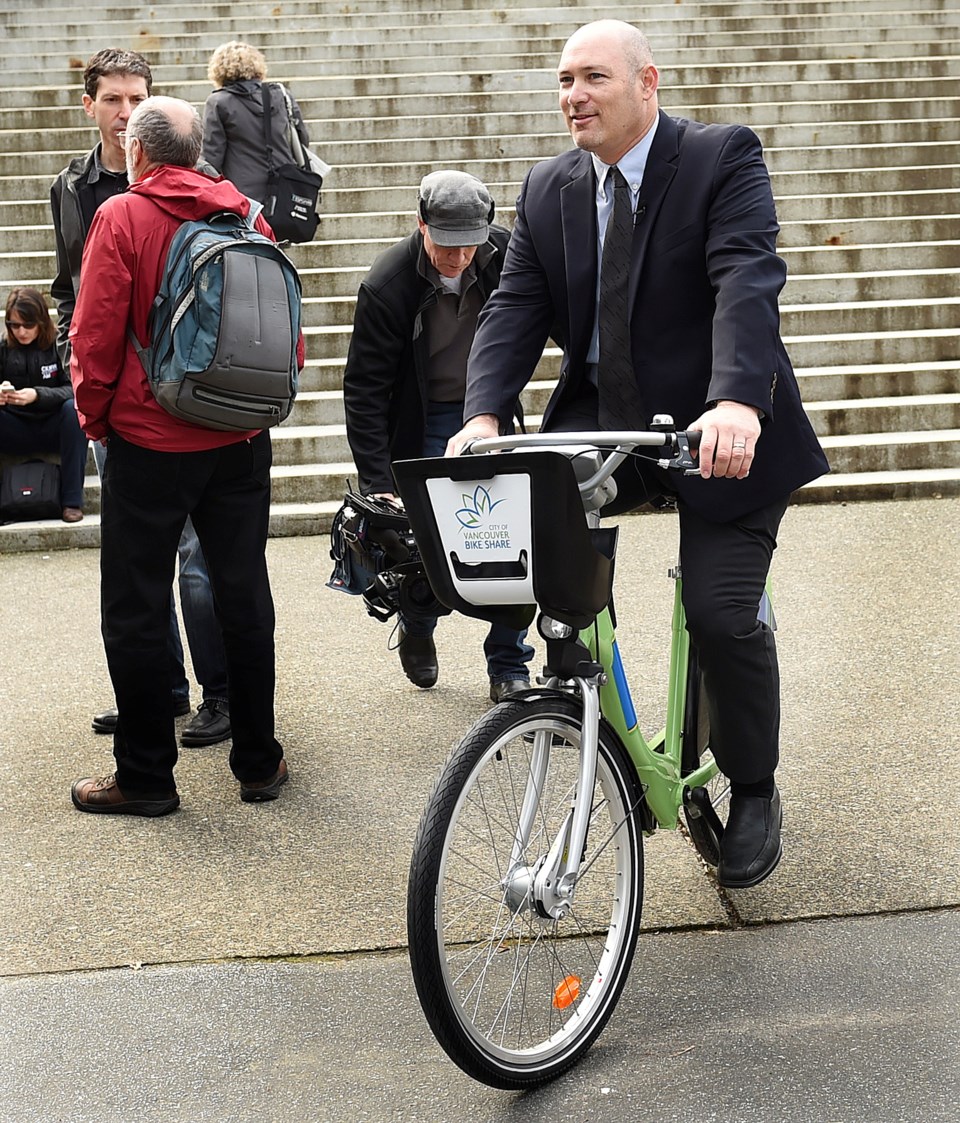The head of a bike share company that will launch a new system in Vancouver this summer has promised not to “undercut” rental rates of existing bike companies worried about the impact 1,500 rental bikes will have on their businesses.
Josh Squire, founder and CEO of CycleHop Corp. Canada, made the promise Wednesday at a news conference at city hall, where he joined city officials and Charles Gauthier of the Downtown Vancouver Business Improvement Association to promote the “smart bike” system.
“We don’t want to compete with the local bike rental shops, and we don’t want to undercut their pricing,” Squire told reporters. “So we’re looking at the average price that’s out there today and we’re going to make sure that we’re competitive with that, and not under that.”
Squire didn’t reveal an hourly price to rent a bike but suggested a monthly membership would cost “roughly” $20 per month. That membership would allow a customer unlimited 30-minute rides for the month, he said.
Landing on a set hourly rate could prove difficult for CycleHop, considering the rates of rental shops vary widely. For example, a one-speed cruiser bike (with a lock and helmet) rents for $6.67 an hour at Spokes Bicycle Rentals on Georgia Street, near the entrance to Stanley Park. In Yaletown at Reckless Bikes on Davie Street, a hybrid bike (with a lock, helmet and a map) costs $18.50 to rent for an hour-and-a-half.
STATION LOCATIONS
Both bike stores are concerned about the rental rate for a CycleHop bike and where the 150 stations will be located. Squire said his company plans to consult with residents and businesses before setting up the stations, which will be concentrated mainly in downtown and extending to an area bounded by Arbutus Street, 16th Avenue and Main Street.
“Those are two key considerations, obviously — pricing and location,” said Paul Dragan, owner of Reckless Bikes, which has stores in Yaletown, near Granville Island and on Hornby Street. “I’m not anticipating my business going up because of bike share coming to Vancouver. I’m anticipating a drop in my overall rental. But I don’t think it’s going to be drastic for me. I don’t know if it’s going to be drastic for the other people.”
Sarah Vetter, marketing and sales manager for Spokes Bicycle Rentals, said the bike share system will obviously affect rental sales. But by how much will have to be determined after CycleHop sets up its stations, said Vetter, noting the majority of Spokes’ customers are tourists and primarily ride bikes in Stanley Park.
“I don’t think they need to be around the park,” she said of the station locations. “We’re obviously all pro-bike and I think we can work cohesively together. But there has to be some sense of respect for what we’ve been doing all these years and the service we’ve been providing.”
Jerry Dobrovolny, the city’s general manager of engineering services, told reporters that stations will not be set up outside existing bike rental stores. But he suggested stations could be allowed within a third or half a block of a store.
Though Gauthier spoke in favour of the bike share system at the news conference, he later told the Courier he didn’t agree that stations should be allowed a third or half a block away from a rental shop.
“I think they may have to be further [away from a rental shop], so there has to be some negotiation there,” said Gauthier, noting his endorsement of the bike share system does not discount concerns of bike rental shops. “Their concerns are legitimate and I would never downplay them, or try to tell them they shouldn’t worry about it.”
BIKE PROGRAM TARGETED AT LOCALS
Generally, Dobrovolny said, bike share systems are used primarily by locals for quick trips. Dragan said tourists account for about 50 per cent of his rental business, with the other half from locals, although he noted some of the locals end up renting bikes for friends visiting from out of town.
Dragan and others in the bike business had lunch with Squire after the news conference. He came away from that meeting with the understanding CycleHop will use its website to promote the advantages and disadvantages of using the bike share system versus a rental bike store. For example, Dragan said, a family of four with young children could not use CycleHop’s bikes because they are only in adult sizes. Also, they’re not set up to attach to a baby trailer, he added.
“What they say they’re going to do and what they actually do, well reality is reality,” Dragan said. “But I’m cautiously optimistic. I think long term, in three to five years when everyone has adjusted to the new reality, that it’s going to be a great program. But I think there’s going to be short-term pain and adjustment for the guys who only rent bikes.”
The city’s deal with CycleHop means it will cost taxpayers $5 million over the five years of the agreement. The city could also lose up to $2 million in parking meter revenues. But that loss depends how many meters will be removed to make way for the bike stations.
The bikes are expected to have seven speeds and be equipped with back and front lights. Helmets will come with each bike. A membership card, or one gained from a kiosk, allows each rider to swipe it on a small pad on the handlebars. A rider will enter a code, which will unlock the bike.
@Howellings



